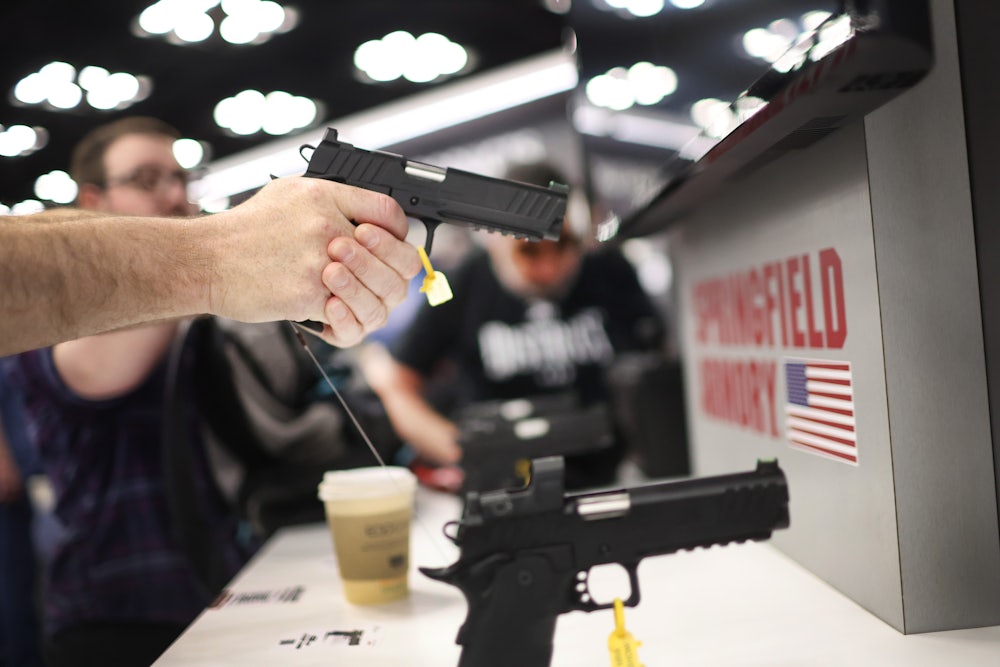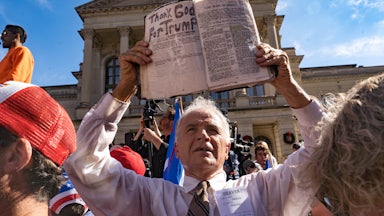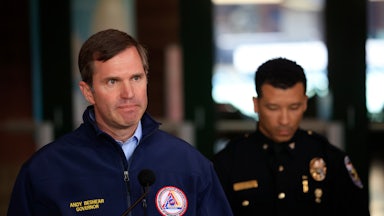I am a gun owner. And not just one who keeps a firearm in a safe, to be used so infrequently that I have to refamiliarize myself with how to handle it. I have conceal-carried for years, an everyday bearer of a gun that’s chambered and loaded and on my person everywhere I go, unless it’s prohibited by law or by the policy of a business I frequent. I once even owned an AR-15.
For years, I voted for Republicans, including twice for former President Donald Trump and once, in 2018, for Florida Governor Ron DeSantis. I have come to see the modern-day Republican Party as a destructive force in our lives. And I have come to want the Second Amendment to be repealed, because it has close to zero modern-day applicability; it now enables bloodshed beyond anything the Founders might have imagined or been willing to endure.
Stripping the Second Amendment from the Constitution: It’s not likely to happen anytime soon—or probably ever. Does that mean that all hope is lost in the fight for the lifesaving policies and laws we so desperately need? TNR contributor Brynn Tannehill makes a very persuasive case for futility; perhaps she is correct.
But I take some hope from my own experience of leaving the Republican Party behind. I’m not anyone’s idea of a liberal convert, but as I’ve been walking the common ground more often, I still feel there’s something fertile beneath my feet. Something that might be nurtured by voices such as my own: a gun owner who despairs at the mayhem and yearns for something better.
I don’t believe I’m alone; there are millions like myself. But when was the last time you heard a concealed-carrier propose we get rid of the Second Amendment? What keeps these voices silent is something I’ve written about before: the Republican Party’s insistent demand that its adherents subscribe to a set of historical revisions and politically traumatizing myths.
We must take stock of the landscape and acknowledge an irrefutable reality: There are millions of Americans for whom avoidable deaths—whether from guns or a pandemic for which a no-cost, life-preserving vaccine is available—are acceptable, and too many of these millions vote Republican. There are Republicans with whom I once socialized who have acknowledged this to me privately. These are highly educated and highly credentialed people, who work in industries that are far more regulated than the firearm industry. They still believe a Republican is always preferable to a Democrat. This is what political traumatization wreaks: You learn to accept needless death and become indifferent to, if not defend, politically motivated violence, whether it’s an insurrection at the Capitol or a punch-up at a school board meeting.
We can trace the damage to four words in the Second Amendment: “Shall not be infringed.” It is these four words that have turned so many of our schools, our banks, our places of worship, our malls, our movie theaters, our workplaces, our Fourth of July parades, our bars and nightclubs, our—really, just fill in the blank—into blood-splattered abattoirs.
This is where the plot is lost, over four words that denude the Second Amendment of any modern-day contextual value and meaning. Four words useful only in a cloddish defense of guns as instruments in a holy war against imaginary boogeymen: pedophiles, sycophants of Satan, Communist plants, and covert Islamic agitants born in Kenya. “Shall not be infringed,” because the culture war will yield a new phantasmic threat tomorrow, against whom the GOP’s traumatized foot soldiers must stand their ground.
Most Americans have little, if any, understanding of the Founders’ underlying intention with regard to the Second Amendment—a famous compromise of James Madison. And while numerous factors were considered in its text and inclusion in the Bill of Rights, the most important goal of the Second was to prevent the federal government from starting a professional army.
Why was this so important, especially to the Southern states, where the populations of enslaved people were disproportionately higher than elsewhere in our new nation? Militias controlled safety and security of these states, where the paramount concerns were revolts among the enslaved and a persistent fear that the federal government would eventually outlaw slavery and thus have cause to disarm states. Slavery was upheld in our original Constitution, as a propitiation between Southern states—where the economy thrummed on the backs of human chattel—and the states that had either no use for slavery or were considering its abolition.
Furthermore, there was a fear among some of the Founders that the Haitian Revolution—the first-known successful uprising in the Americas of enslaved persons against their masters—would inspire slaves in the United States to revolt against their masters. The Second Amendment was wrought from these fears and desires; it should be mentioned that Blacks were overwhelmingly prohibited from keeping and bearing arms.
I’ll generously concede that the return of foreign aggression from Britain was among the concerns that underpinned the formation of the Second Amendment. But the Bill of Rights was ratified more than eight years after the Treaty of Paris was signed. British aggression was, at the time, in the rearview mirror and had minimal influence on the purpose and intent of the Second Amendment.
Our nation gratefully and gradually moved toward the abolition of slavery. The Second Amendment should have been amended to keep up with the times. That opportunity was never taken; we’re stuck with a historical anachronism on our backs.
It’s not that some individual right to keep and bear arms isn’t inherent in the Second; there is, and that was the basis for the U.S. Supreme Court’s majority decision in District of Columbia v. Heller. While all legal rulings are activist to some extent, Heller was not egregiously so: The decision was narrow in its scope, so much so that even former President Barack Obama agreed with the case’s outcome. What the political right, however, omits from its Heller cheerleading is that while the majority ruled that individual or private ownership of arms is constitutionally protected, the majority decision left it unambiguous that individual or private ownership of guns is also subject to more rigorous regulation than originally imagined for membership in a militia.
You could stitch the words “shall not be infringed” to the end of the text enumerating any constitutional right, and it would not change the fact that none of these rights are absolute. Claiming that the Framers wrote “shall not be infringed” to affirm the right to keep and bear arms as an unregulated right is laughable. But Republicans created this mythic interpretation of the Constitution’s text, and have united the open-carry cult who fancy themselves to be the modern-day descendants of General Washington’s army, and the droves of wannabe militiamen who think the Constitution contains a cheat code that permits open rebellion against the U.S. government. This is a powerful falsehood that has begotten all of these “good guys with guns.” No one from the gun lobby or the Ivy League class of well-heeled Republican electeds actually believes this bullshit.
I believe the GOP is a terminally ill party, and they know it. This creates a powerful incentive to cultivate more gun-related violence, death, and suffering. The better to create the perception that America is a violent dystopia in need of authoritarian correction; a civilized world that Democrats cannot deliver.
And yet there are a great many federal legislative solutions that are supported by the vast majority of Americans, including gun owners. These include raising the minimum age for gun ownership, creating a national firearm registry to assist law enforcement in criminal investigations, mandatory background checks for would-be owners (and perhaps even annual background checks after gun purchases), regulation of certain kinds of deadly ammunition that only exists for the purpose of committing crimes, limits on magazine capacity, and red flag laws―irrefutable lifesavers—in all states.
Survivors of gun violence, and the bereaved who have buried their loved ones and friends, are among our most important gun safety activists. But the onus to forge change cannot fall solely on them. Millions of Americans just like myself—that is to say, “gun guys”—have a critical role to play in this fight. We’re the ones who can pierce the veil of illusion that the Second Amendment has become, and tear down the pernicious myths that have been allowed to flourish.
We can no longer deny that some within our culture celebrate violence and accept avoidable deaths; they are winning, at the moment, and will continue to win if more “good guys with guns” don’t step up to be good guys with ideas. I understand the ambivalence of speaking up. But with each mass shooting and every tragedy that can be traced back to a gun, we keep crossing and recrossing a basic demarcation of decency. If we erase this boundary, there will be no redemption. And the first step to modernizing our firearm policies is to mercy-kill the Republican Party at the polls, every chance we get.
In 1789, Thomas Jefferson wrote in a letter to Madison that the “earth belongs always to the living generation”; to his mind, every constitution should naturally expire at the end of 19 years. “If it be enforced longer,” Jefferson wrote, “it is an act of force, and not of right.” Much of what our Founders have provided has proven durable, but the Second Amendment is tethered to an epoch of America that has not existed for centuries. The living must demand that our gun laws reflect life in the twenty-first century and beyond—otherwise, we may not make it there alive.










